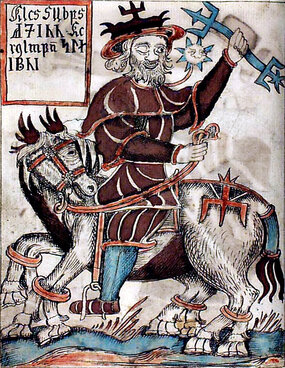In scholarship, Óðinn is often considered to be the most complex Old Norse god. Over time, Óðinn has been interpreted as e.g. a Nordic Odysseus, Bacchus, Buddha, Mercury/Hermes, Attis or Thoth, and parallels have been found to e.g. Mithras, Zeus, Vishnu, Krishna, Mars, and Pluto. It has been argued that Óðinn is a sun-god, a wind-, air- or storm-god, and leader of the army of the dead, a sky god, a psychopomp, a shaman, a god of royalty, and a god of the divisions of time. He has been characterised as a battle god, a god of fate, a god of poetry, and finally, a duality in his character has been noted. The reason for the manifold interpretations of Óðinn can be found in the shifting emphases in research history and in the texts themselves, since Óðinn is the Old Norse god who appears in most Old Norse sagas and poems, written with different purposes.
One of the recurring features in the stories of Óðinn is wisdom, in which scholars have found a feminine component. In many stories in sagas and eddas, we see the god searching for wisdom, testing the wisdom of others, and finally giving wisdom and advice. The paper will delve into these stories asking which wisdom Óðinn gives, and to whom. Is Óðinn’s wisdom always for the benefit of the listener? Is his wisdom a weapon? And is Óðinn as wise as he wishes to appear?
Conférence organisée par Peter Andersen (ARCHE) et Thomas Mohnike (MGNE)
